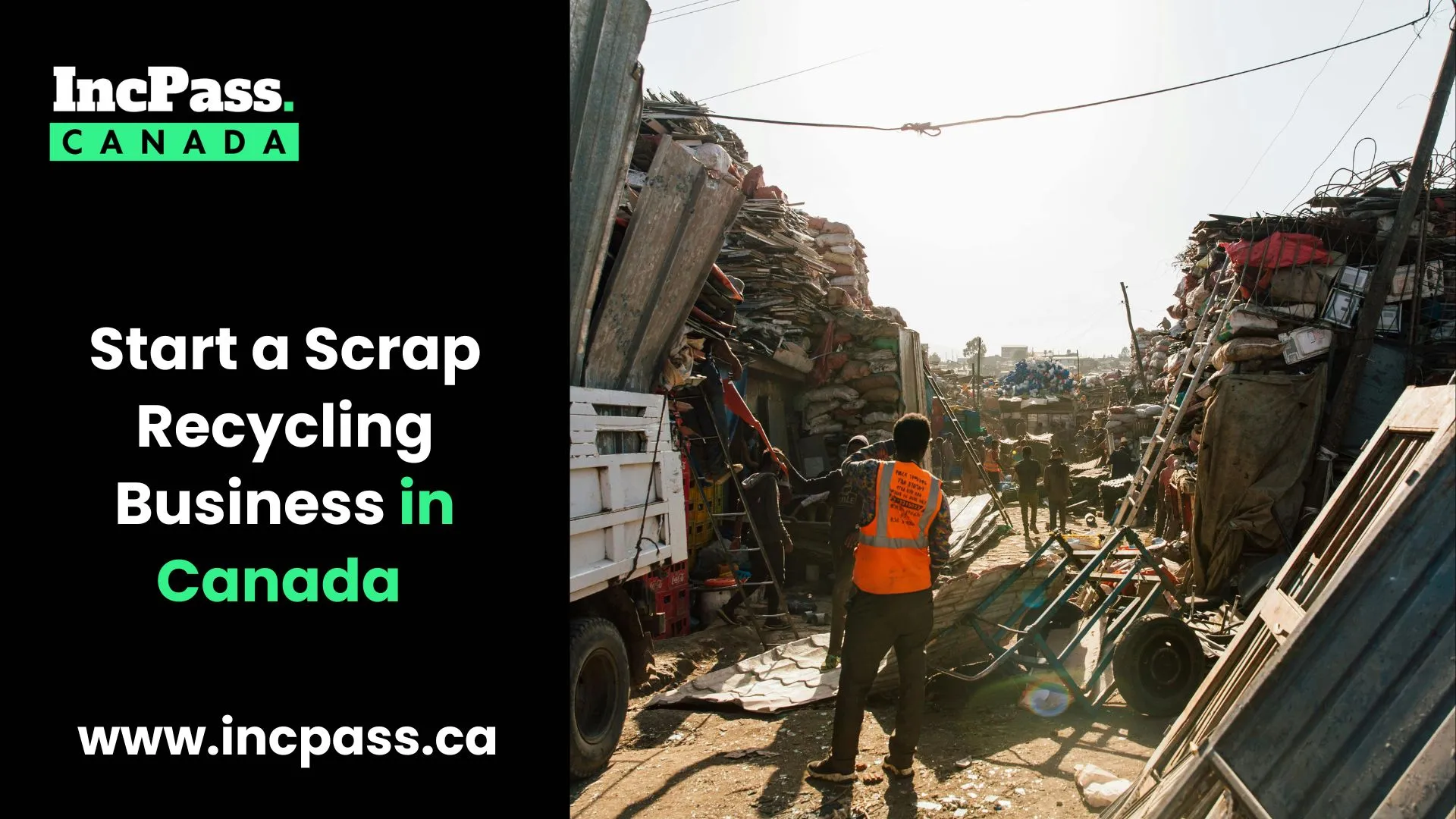Introduction
Starting a scrap recycling firm in Canada offers a lucrative opportunity in an industry worth more than $10 billion each year. With a growing emphasis on sustainability and trash management, Canada recycles over 16 million tonnes of scrap metal each year.
Entrepreneurs wishing to launch a scrap recycling business in Canada may capitalise on rising demand while also helping to protect the environment. The business needs knowing legislation, obtaining relevant licences, and investing in equipment, but the potential profits are enormous.
This article will walk you through the necessary stages for effectively starting a scrap recycling business in Canada, including legal requirements, finance possibilities, and sustainable practices.
Legal Requirements to Start a Scrap Recycling Business in Canada
To start a scrap recycling business in Canada, ensure that the following are met:
- Business Registration: Submit your company name to the appropriate provincial or federal authorities.
Obtain environmental licences to operate in accordance with provincial legislation such as Ontario’s Environmental Protection Act (EPA).
- Municipal Permits: Obtain local permits, such as zoning approvals, to verify your business location complies with municipal standards.
- Waste Management Licences: Request waste management and transportation licences for scrap items.
- Health and Safety Compliance: Follow provincial labour laws’ workplace safety regulations, which include proper training and equipment use.
Consider joining recycling organisations such as the Canadian Association of Recycling Industries (CARI) for networking and compliance assistance.
Choosing the Right Location to Start a Scrap Recycling Business in Canada
When picking the perfect location for a scrap recycling business in Canada, consider the following factors:
- Proximity to Supply: Select a location near industrial areas or urban centres with a steady supply of scrap materials.
- Zoning Regulations: Make that the site complies with municipal zoning laws, which may differ between provinces.
- Accessibility: For effective scrap movement, choose a site with strong transportation infrastructure, such as access to highways, railways, or ports.
Check for provincial environmental legislation (e.g., Alberta’s Environmental Protection and Enhancement Act) that may affect your site selection.
- Land Cost: Take into account the cost of land in different provinces while matching operational needs with budget limits.
Essential Equipment and Technology to Start a Scrap Recycling Business in Canada
Consider investing in the equipment and technologies listed below to run a profitable scrap recycling business in Canada.
- Shredders and crushers: Used to reduce large metal objects to smaller, more manageable fragments.
- Balers and compactors: Used to compress scrap materials so they can be handled and transported easier. Magnets and separators are required for separating ferrous and non-ferrous metals.
- Shears and wire strippers: Used to cut and prep metal scrap for recycling.
- Material Handlers: Forklifts and cranes are used to transport heavy scrap efficiently.
- Recycling Software: Digital tools for managing sales, keeping track of stocks, and guaranteeing regulatory compliance.
Funding Options to Start a Scrap Recycling Business in Canada
Entrepreneurs starting a scrap recycling business in Canada can explore these funding possibilities:
- Government Grants and Loans: Examine state and federal initiatives including eco-friendly subsidies for recycling companies and the Canada Small Business Financing Program (CSBFP).
You can get loans from banks and credit unions to assist pay for operational expenses, land, and equipment.
- Private Investors: Look for investors interested in green initiatives and sustainable businesses.
- Venture Capital: Approach venture capital firms that specialise in environmental and recycling.
- Crowdfunding: Use platforms such as Kickstarter or GoFundMe to raise funds from members of the community who want to support recycling activities.
Some industry associations provide financial aid or incentives to recycling enterprises.
Sustainability Practices When You Start a Scrap Recycling Business in Canada
Energy-Efficient Equipment: Invest in machinery that saves energy and lowers your carbon footprint.
- Water conservation: To reduce waste, implement technologies that recycle water used in the recycling process.
- Emission Control: Install filters and emission-reducing equipment to meet Canadian environmental laws.
- Sustainable Sourcing: Work with suppliers who use ecologically responsible techniques.
- Waste Minimization: Recycle or repurpose byproducts from the recycling process to help reduce overall waste.
- Green Certifications: Pursue eco-certifications such as LEED to boost your company’s sustainability credentials and attract environmentally sensitive customers.
CONCLUSION
Starting a trash recycling business in Canada presents a special chance to support environmental sustainability while simultaneously entering a lucrative market. With millions of tonnes of scrap recycled each year, there is a growing need for recycling services, fueled by increased environmental consciousness and legislative backing. Success in this market takes meticulous planning, from obtaining necessary permits and selecting the ideal location to investing in crucial equipment and sustainable practices.
Exploring funding possibilities, such as government programs, private investors, or venture capital, can assist lower beginning costs. You may ensure that your business runs sustainably by using eco-friendly measures such as energy-efficient equipment and trash reduction.
With effective implementation, a scrap recycling firm in Canada may be both profitable and environmentally beneficial, matching profitability with the growing demand for responsible waste management.
Connect with the team to get more information about how to start a business click on the link below.
FAQs
What are the initial startup costs for a scrap recycling firm in Canada?
Equipment, permits, property, and operations fees are all considered initial costs. Costs vary based on the location and size of operations.
What permits are required to establish a scrap recycling business in Canada?
Environmental approvals, municipal zoning permits, and waste management licences are all examples of permits. Requirements vary by province and municipality.
How can I discover the right location for my recycling business?
Consider the proximity of scrap sources, zoning regulations, transit access, and land costs. Check municipal and provincial requirements.




